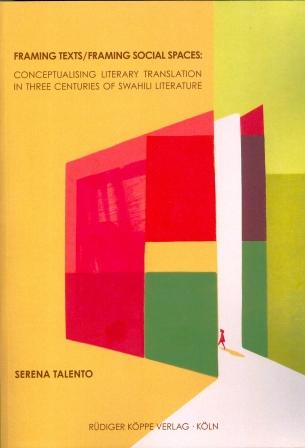
Framing Texts – Framing Social Spaces
Conceptualising Literary Translation in three Centuries of Swahili Literature
Author: Serena Talento. Series edited by: Wilhelm J.G. Möhlig †.
Series: WK Verbal Art and Documentary Literature in African Languages Volume 42
202114 pp. Roman, 398 pp.
2 colour figures, 19 b/w figures, 3 comic strips, numerous tables and overviews, 4 appendices
Format: 170 x 240 mm
850 g
Paperback
€ 69.80
Buy 'Framing Texts – Framing Social Spaces' as a downloadable PDF document directly from our online shop »
Order 'Framing Texts – Framing Social Spaces' as print edition »
Discourses on translation are a symbolic production that provide a key to understanding how texts and practices are conceptualised and given meaning in the process of (re)producing knowledge, which in turn shapes social realities.
The objective of this study is to investigate the discourse on literary translation into Swahili from a comparative and diachronic angle, as well as from a sociological perspective, in order to identify the deep entanglements among sociocultural situatedness, historical contingencies, and literary receptivity that frame the circulation or rejection of literary translations.
Three historical settings at particular moments of dramatic social change are explored, namely the seizure of power on the East African coast by Oman, British rule in Tanganyika, and the nation-building project in post-independence Tanzania. Major questions addressed in this book include: have there been major translation flows? What were their main functions? How have Swahili literary translations and translators been conceptualised throughout history? What motivated translators to translate specific texts? What hindered or favoured their agency?
Pierre Bourdieu’s field theory, concerning the (re)production of knowledge, and Pascale Casanova’s, Johan Heilbron’s and Gisèle Sapiro’s theories of the circulation of symbolic goods in an international space of cultural, political, and economic relations provide a framework for exploring of the dynamics of literary importation into Swahili. However, the specificity of the context explored here, has required the canonical narratives of consecration, heterodoxy/orthodoxy dichotomy, and autonomy to be critically questioned and modified.
The method adopted in this book builds networks among translation flows, para- and extratextual analysis, the inclusion of sociocultural and historical facts (contextual analysis), and the analysis of the literary field and agents’ trajectories. In so doing, the focus of the analysis moves from a macro-(context) to a microperspective (texts and discourses) and back again.
While many differences can be found in the three historical settings presented in this book, the findings reveal that the discourse on translation is a unique site where different (intellectual, political, economic) spheres speak to each other. The discourse on translation has contributed to the formation, or in other cases adjustments or erasure of literary as well as social and political spaces. This book thus throws light on the use of literary translation as a platform where the demands, needs, or visions of individuals or social and political groups could be channelled.
Under these links you will find further modern and historical Swahili text editions and analyses:
Accompanying material:
- African Languages in Global Society / Les langues africaines à l’heure de la mondialisation / Lugha za Kiafrika kwenye enzi ya utandawazi
(ISBN 978-3-89645-259-7 ) - Beyond the Language Issue
(ISBN 978-3-89645-819-3 ) - Dunia Yao – Utopia/Dystopia in Swahili Fiction
(ISBN 978-3-89645-736-3 ) - Encoding Emotions in Swahili
(ISBN 978-3-89645-715-8 ) - From the Tana River to Lake Chad – Research in African Oratures and Literatures
(ISBN 978-3-89645-836-0 ) - Life is a Thriller
(ISBN 978-3-89645-830-8 ) - Rewriting Yusuf
(ISBN 978-3-89645-177-4 ) - The Voice of the Text and its Body
(ISBN 978-3-89645-739-4 ) - Vamps and Victims
(ISBN 978-3-927620-74-2 )
Cross-reference:
- Afrikanische Frauen und kulturelle Globalisierung / African Women and Cultural Globalization / Femmes africaines et globalisation culturelle
(ISBN 978-3-89645-318-1 ) - Kala Shairi
(ISBN 978-3-89645-171-2 ) - Life and Poems of Bi Zainab Himid (1920–2002) / Maisha na Tungo za Bi Zainab Himid (1920–2002)
(ISBN 978-3-89645-286-3 ) - Liyongo Songs
(ISBN 978-3-89645-172-9 ) - Muhamadi Kijuma
(ISBN 978-3-89645-174-3 ) - Texte auf Textilien in Ostafrika
(ISBN 978-3-89645-266-5 ) - Unser Leben vor der Revolution und danach – Maisha yetu kabla ya mapinduzi na baadaye
(ISBN 978-3-89645-274-0 )
| « back | Print version | [top] |
 Books
Books Audio
Audio Biographies
Biographies Series
Series Festschrifts
Festschrifts Journals
Journals